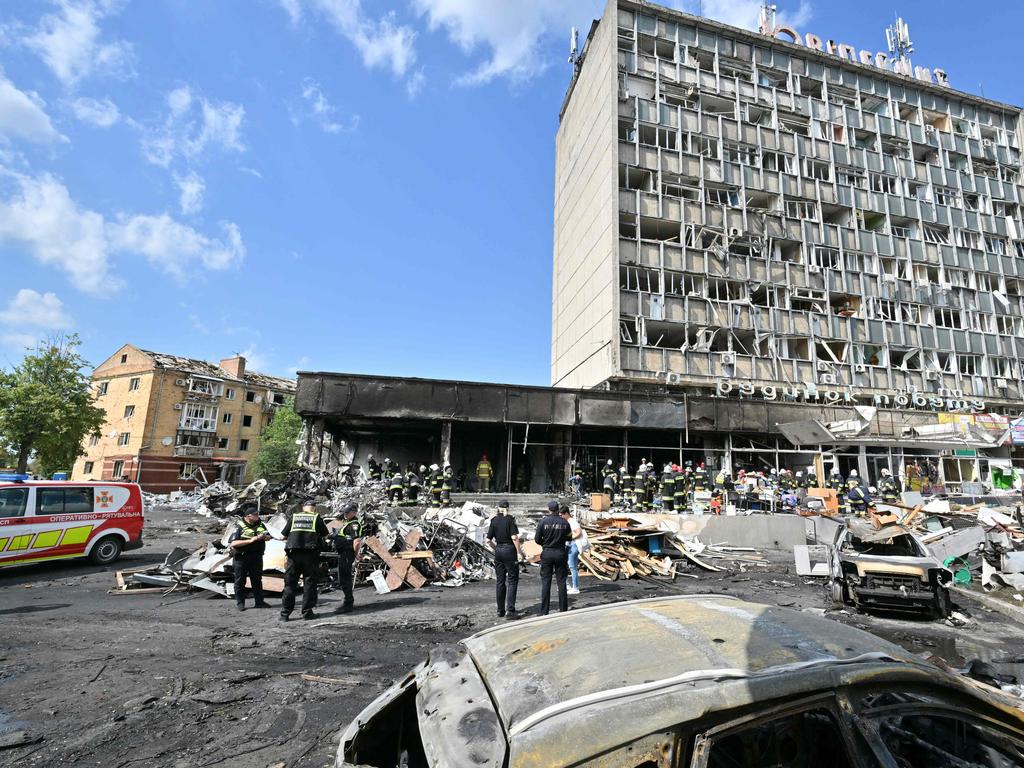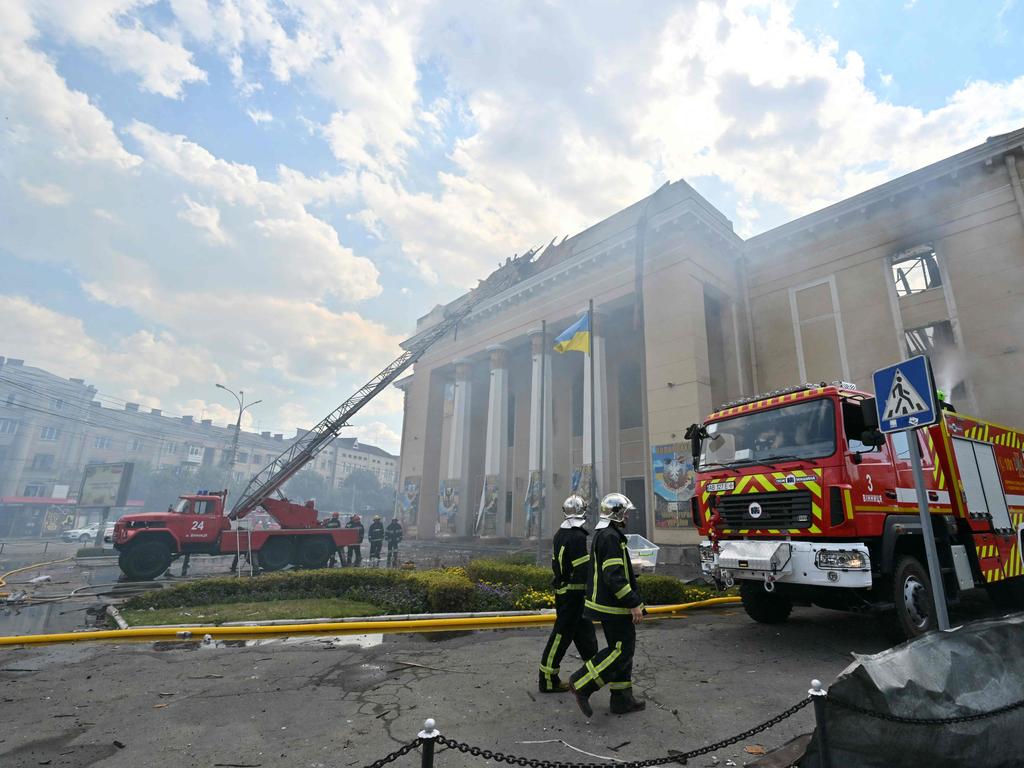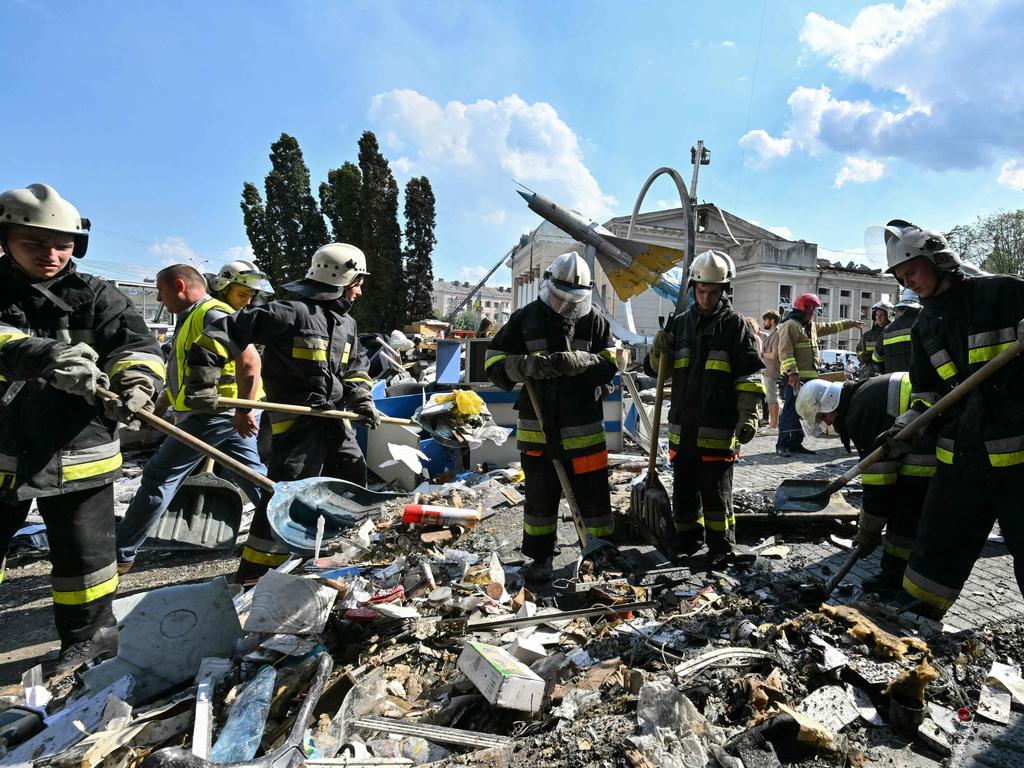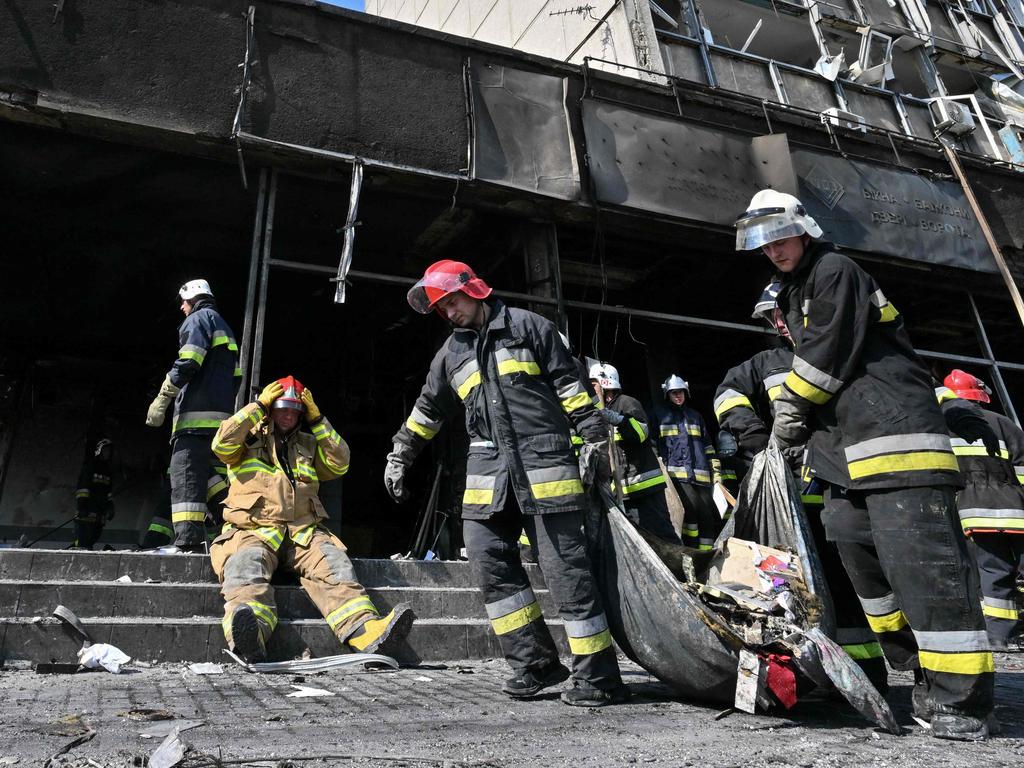
This article is more than
3 year old
Russian missiles fired from submarines in the Black Sea have struck a Ukrainian town hundreds of kilometres from the front lines and invading troops, killing at least 22 people, including children.
The midday attack on the city of Vinnytsia in central Ukraine came as EU officials convened in The Hague to discuss war crimes in the country on Thursday.
Three children are among the dead and dozens of people are still unaccounted for, according to Ukraine’s State Emergency Service.
A further 52 people, including four children, have been hospitalised — 34 of whom are in a serious condition, SES said.
Ukrainian President Volodymyr Zelensky described the attack as “an open act of terrorism”.
The charred remains of upturned cars surround by burnt debris were seen in images distributed by officials next to a business gutted by a fire with brown smoke billowing nearby.

“There were eight rockets, two of which hit the centre of the city. Twenty people have died, including three children. There a large, large number of wounded,” Zelensky said during an address European official at The Hague.
The Ukrainian leader led a moment of silence before urging European and International Criminal Court officials during an address to open a “special tribunal” into Russia’s invasion.
“I believe it is inevitable that International Criminal Court will bring accountability to those guilty of crimes under its jurisdiction: war crimes, crimes against humanity, genocide.”\
War crimes tribunal
The ICC in The Hague opened an investigation into possible war crimes in Ukraine just days after Moscow’s forces invaded and it dispatched dozens of investigators to the country to gather evidence.
Russia invaded on February 24 and the conflict has seen thousands of people killed, destroyed cities and forced millions to flee their homes.
“Every day, Russia kills civilians, kills Ukrainian children, carries out missile attacks on the civilian facilities where there is no military target. What is this, if not an open act of terrorism?” Zelensky said after the Vinnytsia attack. Ukrainian Foreign Minister Dmytro Kuleba called on Thursday for the creation of a special tribunal “on the crime of aggression against Ukraine” that will bring to account Russia’s “top military and political leadership.”
“Together with other countries, organisations and institutions, we shall use all available tools to get justice for the thousands of innocent victims of this crime, and we shall not rest until the guilty are brought to justice,” Kuleba said in his address to an international conference in The Hague on crimes committed in Ukraine.


A Ukraine military spokesman said its forces had managed to knock out two from a barrage of cruise missiles that were launched from a Russian submarine in the Black Sea and caused widespread damage in Vinnytsia.
Deadly strikes in central Ukraine have become relatively rare, but the war has raged around cities like Mykolaiv in the south which the presidency said was hit by a “massive missile strike”.
“Two schools, transport infrastructure and a hotel were damaged,” the presidency said in its morning military update early Thursday.
The skeletal insides of one building gutted by the strikes were visible in images distributed by local officials, with municipal workers clearing bricks and rubble strewn after the attack.
The heaviest fighting in Ukraine, however, has focused recently on the industrial Donbas region in the east.

‘Total victory’
Moscow-backed troops there said Thursday they were closing in on their next target, after wresting control of sister cities Lysychansk and Severodonetsk two weeks ago.
“Siversk is under our operational control, which means that the enemy can be hit by our aimed fire all over the area,” a pro-Moscow rebel official, Daniil Bezsonov, was cited as saying by Russian state-run news agency TASS.
In a Ukrainian trench position along the eastern frontline, a 25-year-old soldier who goes by the nom de guerre Moryak was working to fortify defences.
“We hide when they shell, we dig when it’s calm,” another soldier nearby told AFP journalists.
A fellow serviceman in their trench dismissed the idea Ukrainian and Russian forces could reach an agreement to halt fighting, explaining their goal was “total victory”.
High-stakes grain talks
Several rounds of negotiations to end the fighting at the beginning of the conflict fell through, but delegations from Kyiv and Moscow met in Istanbul this week to discuss unblocking Ukraine’s grain exports.
The meeting involving UN and Turkish officials ended after more than three hours with an agreement to meet again in Turkey next week.
Zelensky said “the entire world” was counting on the negotiations to finalise a deal.
The conflict has pushed up grain prices and Europe is suffering from skyrocketing energy bills stemming from sanctions on Russia and Moscow’s move to limit gas flows to Europe.
US Treasury Secretary Janet Yellen said Thursday that Russia’s war in Ukraine posed the “greatest challenge” to the global economy, as G20 ministers prepare to start talks in Indonesia.
The European Commission meanwhile slashed growth forecasts for the eurozone, saying the consequences from the war in Ukraine were continuing to destabilise the economy because of record high inflation.